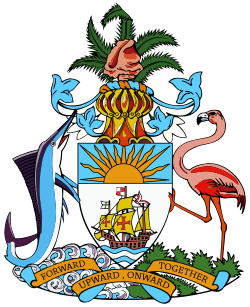Coat of arms of the Bahamas
| Coat of arms of the Bahamas | |
|---|---|
 |
|
| Details | |
| Armiger | Elizabeth II in Right of the Bahamas |
| Adopted | 7 December 1971 |
| Crest | On a golden helmet affronty, lambrequined Argent and Azure a conch of the Giant Wingsnail and five palmleaves proper. |
| Torse | Or and Azure |
| Escutcheon | Argent, Christopher Columbus’ Santa Maria in full sail proper, on a base barry wavy of four Azure and Argent; and a chief Azure, a rising sun radiant Or. |
| Supporters | On the dexter a Blue Marlin and on the sinister a red flamingo proper. |
| Compartment | Waves of the sea on the dexter and a grassy ground on the sinister proper. |
| Motto | Forward, Upward, Onward Together |
The Coat of Arms of the Bahamas contains a shield with the national symbols as its focal point.
Divided, in chief azure a rising sun irradiated or, in base, argent a Columbus ship proper surmounts barry nebuly of two azure;
Crest: atop a Sovereign's helm or a conch shell proper surrounded by five palm fronds vert on a wreath of the chief's colours, from which issues mantling azure lined argent;'
The escutcheon (shield) is supported by a marlin and flamingo. The crest on top of the helm (helmet) is a conch shell, which represents the varied marine life of the island chain. Below the helm is the escutcheon itself, whose main charge is a ship, reputed to represent the Santa María of Christopher Columbus. It is sailing beneath a sun in the chief. The animals supporting the shield are the national animals, and the national motto is found at the bottom. The flamingo is located upon land, and the marlin upon sea, indicating the geography of the islands.
The vibrant tinctures of the coat of arms are also intended to point to a bright future for the islands. They are also reputed to have been maintained for their attractiveness to tourists.
The Coat of Arms was approved by Her Majesty, Queen Elizabeth II on 7 December 1971 for use by the Bahamian People and the Commonwealth of The Bahamas. It was designed by Bahamian artist and clergyman, Rev. Dr. Hervis L. Bain, Jr., who is also a Member of the Order of the British Empire.
In addition to the National Coat of Arms, there are a total of eighteen regional island shields (including two unofficial devices). These were granted upon Independence in 1973, to be displayed at the Independence day celebration to reflect each island's individual cultural heritage.
...
Wikipedia
